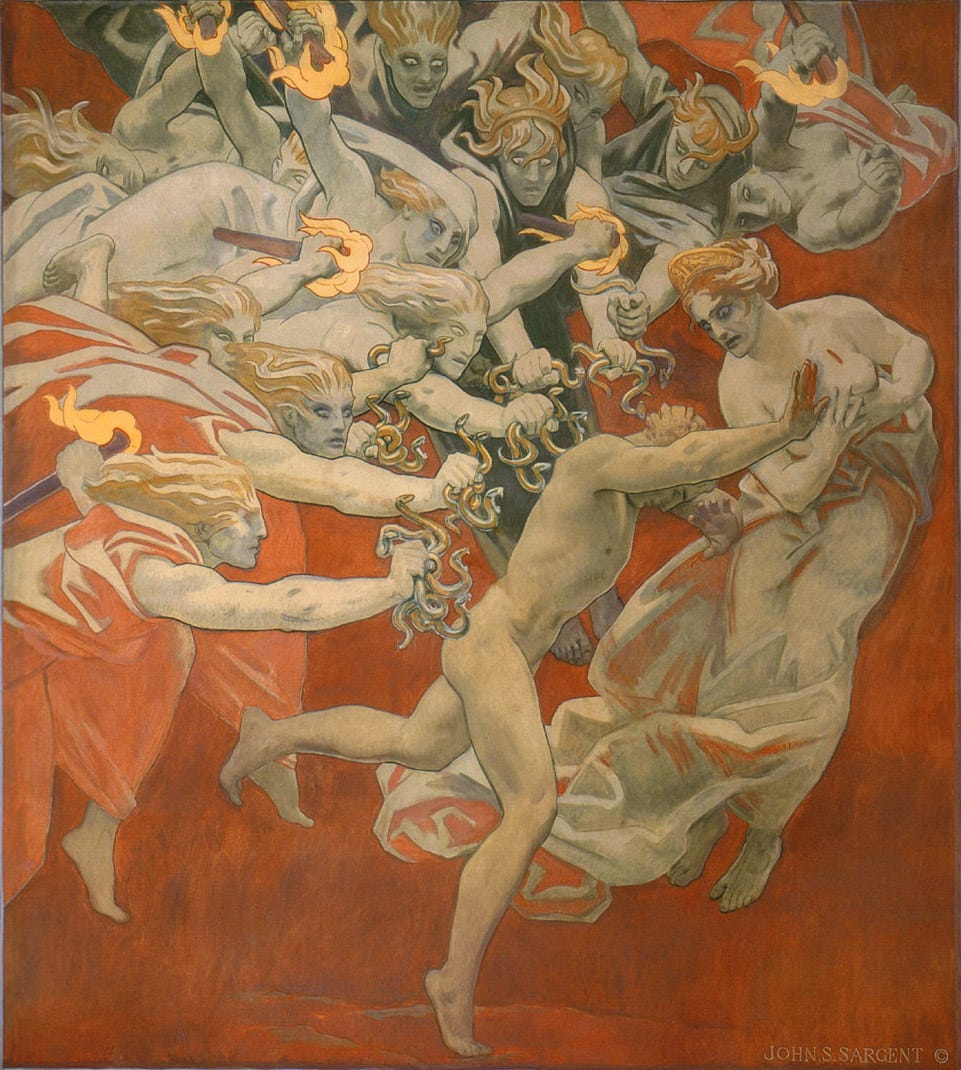The House of Atreus: putting your family dysfunction into some much needed perspective after the holidays 🔪
However bad your Christmas was, I seriously doubt you were fed your own kid at dinner.
I was recently reminded of the quote by Ram Dass;
“If you think you’re enlightened, go spend a week with your family."
As we’re over half-way through January, I hope you’ve recovered (or that you’re at least in the process of recovering) from what is typically a time rife with regression, family spats, and an ungodly amount of food. For most people I’ve been speaking to, the waves of the holiday season—and all that these waves drag up to the surface—are still settling so please let me draw your attention to a particular part of Greek mythology to offer you some relief and perspective. If you think your lot could benefit from some family therapy, allow me to PRESENT The House of Atreus.
Now there’s a lot of names and a lot of shit goes down so I’m gonna whip you through it as clearly/succinctly as possibly. Let’s start with Atreus, the head honcho. King of the ancient city Mycenae, Atreus was the son of Pelops and Hippodamia. He had two brothers, Thyestes and Alcathous. Now a curse was said to plague the descendants of Pelops (there’s a whole bunch of backstory here with him and HIS dad Tantalus which I can get into in another newsletter if you’re curious 🧐).
To get the ball rolling curse-wise, the three brothers murdered their half-brother Chrysippus, the product of Pelops’ romp with a nymph. The brothers fled, Alcathous headed to Megara (and stops being important as of now so you can forget his name), and the two remaining brothers headed to Mycenae where Atreus became king, presumably because he was a smidge older. It’s Greek myth so of course we have VERSIONS of what went down next; Thyestes either tried to seduce Atreus’ wife or just had a relatively standard sook about the fact that his older brother was king instead of him. Regardless, he was promptly booted out of Mycenae. To get revenge for this expulsion, Thyestes sent Atreus’ son Pleisthenes, who he’d raised as his own, (he also doesn’t feature in every single version of the story but let’s keep him in for another layer of absurd tragic drama) to kill Atreus, his biological dad. Pleisthenes, unrecognised by his father, was killed immediately. When Atreus figured out who he was and what had happened, he did the only reasonable thing which was invite his murderous brother over for a dinner party to bury the hatchet.
“Shame you sent my son to kill me and he ended up getting killed, would you pass the butter?” — Atreus, probably.
Lo and behold, in one of the most horrific moments of Greek myth (which is really, REALLY saying something), at the end of the meal Atreus reveals that Thyestes has just eaten the flesh of his own son (or sons, depending on the version).
Thyestes fled, horrified, and once more did the only reasonable thing which was impregnate his own daughter Pelopia with the aim of raising another son to avenge him (??????????????????????). THEN Atreus MARRIED Pelopia (his NIECE), and she gave birth to Aegisthus, who Atreus assumed was his son but he was in fact the son of Thyestes.
Now that was just the first LAYER of this murderous, incestuous lasagna. Good news, the names are about to get a smidge more familiar.
Atreus had two sons, Agamemnon and Menelaus, who married two sisters, Clytemnestra and Helen (yes, THAT Helen). Now the next generation may not have had dinner parties with such harrowing mystery meat but they were very much still cursed.

You have almost certainly heard of Helen of Sparta, aka Helen of Troy, the face that launched a thousand ships, i.e. the woman that ran off with or was kidnapped by Paris, a Trojan prince, which kicked off the whole Trojan War debacle. There are many versions of this story, some argue she went willingly, others claim she was taken against her will, and Euripides’ play had her hiding out in Egypt while a ghost/phantom version of her strolled around Troy (??). The point is, even the ancient writers couldn’t agree but by all means start fights in the comments about which version rings true for you.
So Menelaus, one of the earliest/most famous cucks in all of history, had a pretty rough go of things. To really whip through the 10 year battle that was the Trojan War, it was a long and ghastly siege, there were heaps of ships, a whole lot of famous heroes died and a whole bunch of other really bad shit went down. In the end the Greeks won (thanks to Odysseus, the wily minx), and Menelaus finally got Helen back in his clutches, telling his men to leave his wife to him, as he wanted to kill her himself.
Now I stand by any excuse to bring up the ancient comedian Aristophanes but he really does give us, in my opinion, the best version of what happens next in his play Lysistrata. According to him, all Helen had to do was go all girls gone wild, flashing her breasts at her husband, and he forgot all about why he was mad and launched himself at her for other, NSFW reasons. (The ta-tas that launched a thousand ships just doesn’t have the same ring to it). They had a vaguely happy ending; in Homer’s Odyssey, Telemachus visits Helen and Menelaus and they’re just self-medicating to get through the day and honestly can you blame them?
Agamemnon, however, doesn’t get so lucky. For context, I’ve got to take you back to the start of the Trojan War where the Greeks are heading off to Troy to retrieve Helen. Agamemnon has cocked up, offending the goddess Demeter, who responds by halting all favourable winds (so a thousand ships were just stuck there bobbing about and a bajillion soldiers were also stuck, presumably bobbing about). A seer tells Agamemnon that the only way to appease the goddess is to sacrifice his daughter Iphigenia. Agamemnon tells his daughter that it’s her lucky day, she gets to marry Achilles, the best of the best, the cream of the crop. Iphigenia gets all dressed up, her stomach full of butterflies, she’s taken to an altar, and is killed to appease the goddess. Horrifying, unforgivable, necessary, whatever way you slice it (oof), it’s not great.
Enter: Clytemnestra.
I have such a soft spot for her I’m actively resisting turning this into a Clytemnestra newsletter (if you want to read more of my thoughts on her, you can check out a piece I wrote here).
Clytemnestra, the wife of Agamemnon and mother of Iphigenia, doesn’t take this too well ODDLY ENOUGH. To add insult to injury, when Agamemnon eventually returns home ten years later he brings Cassandra, the Trojan prophetess, as a concubine. Clytemnestra is all smiles, welcoming them home, and then promptly murders them both. Agamemnon gets stabbed in the bath and there’s a net involved, it’s a whole thing. Clytemnestra has ALSO been sleeping with Aegisthus, the son of Thyestes (the one who didn’t get eaten and is, according to some versions, the product of retaliatory incest), Agamemnon’s cousin. Did I say she was perfect???
NOW WE’RE ON TO THE FINAL LAYER OF THE LASAGNA. THE LOVELY CHEESY BIT ON TOP. STAY WITH ME NOW.
Clytemnestra and Agamemnon have two children, Orestes and Electra. Orestes gets sent away when he’s little but Electra stays at home and becomes a verifiable daddy’s girl (it seems to be a real case of absence makes the heart grow fonder ~ he’s bailed for a decade and brings home a concubine but she’s STILL on his side. In fairness, she did bear witness to her mum f*cking around with her dad’s cousin which can’t have helped). Orestes, after getting the blessing of the god Apollo (we hate him by the way, he’s the god that cursed Cassandra, making sure that she would always know the insanely tragic thing that was about to happen but no one would believe her), returns home to kill his mother and Aegisthus as payback for his mother killing his father.
It’s all fine, I mean horribly traumatic and tragic, but FINE until the Furies roll in. Now these dreamy hags, also known as the Eumenides, are chthonic revenge spirits—specialising in family-on-family crime—and they did not give a SHIT about what Apollo said. A son killed his own mother so they drove him mad because that’s literally their job.
Orestes and Apollo turn to Athena to get this whole mess straightened out and in one of the earliest cases of pick-me behaviour, Athena proclaims that the mother (in this case Clytemnestra), is just a vessel and therefore Orestes evening the score on behalf of his father trumps Clytemnestra’s role as a mother. Like, we get it, you were born from the head of Zeus, do you want a bloody medal.
Blergh.
What the verdict DOES do, is put an end to the whole bloody mess. The incestuous, murderous lasagna of intergenerational family trauma gets thrown in the bin and the House of Atreus finally has some semblance of peace.
Now if you are suitably/appropriately horrified after reading all that I am SORRY but I hope it at least put your family squabbles into perspective. If, however, you're curious to learn more about this shambolic, murderous family, let me fling some ancient authors at you. We've got a bunch of plays: Aeschylus' Agamemnon, Libation Bearers (Choephoroi), and Eumenides, Sophocles' Electra and Euripides' Electra, Orestes, and Iphigenia in Aulis. I'd start with Oliver Taplin's translation of Aeschylus' Agamemnon. It's sensational.
After writing all that I reckon stay tuned for a Pelops/Tantalus newsletter as it's a lesser known but equally f*cked up story. The next newsletter you're gonna get, however, is going to be SENSATIONAL (I've called in the big guns). Author Natalie Lawrence has written a piece all about the Minotaur with a sprinkling of psychoanalysis so strap in for that. Also, and I'll do a proper post about this, but tickets are officially on sale for my next event in London on Saturday the 15th of February. It’s going to be lush and delicious and fellow substacker
is going to be giving a talk on art history! Check out the details here: Aphrodite’s Archer: an evening with Eros and Psyche.xxxxxxxxxxx










Love this. You’ve made the whole shenanigans so accessible
Fun coincidence: just finished reading the chapter of Odysseus/Trojan war in Madeline Miller’s “Circe”, laid down the book to have one last flick thru Substack before sleep and stumbled upon this article 😃